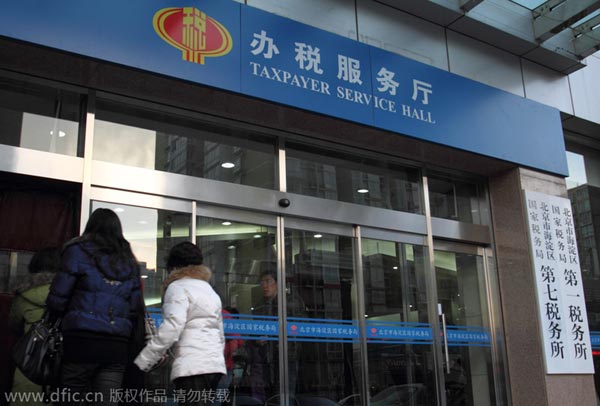VAT to ease firms' burden, boost growth
Updated: 2016-04-28 07:59
By Yang Zhiyong(China Daily)
|
||||||||
 |
|
People enter a taxpayer service hall in Beijing, Dec 13, 2010. [Photo/IC] |
China will replace business tax with value-added tax, or VAT, from May 1 in what is seen as a major taxation reform. The move will reduce the government's tax revenue by more than 500 billion yuan ($76.99 billion), but simultaneously it will ease the tax burden of enterprises. In this sense, the tax reform shows the government is serious about helping enterprises tide over the tough economic situation and further stabilize the macroeconomy.
The replacement of business tax with VAT will eliminate multiple taxes on the same products and help the market play a more decisive role in resource distribution. The pilot program of replacing business tax with VAT will be extended to the remaining four sectors-property, construction, finance and consumer services-to cover all goods and services. VAT will be levied with different tax rates to ensure the implementation of the tax reform and ease the tax burden on various industries.
Also, real estate input tax deduction is an important part of the overall pilot reform.
Propelling the all-round pilot reform is not an easy task, however, because it involves so many industries. To push forward the reform, therefore, the national tax authority and local tax bureaus have to deepen their cooperation.
Business tax is mainly local tax in nature. For tax collection and management, however, local tax bureaus have to employ huge human, physical and financial resources. So after the pilot reform of replacing business tax with VAT, the national tax authority's workload will greatly increase, because this round of trial reform will involve more than 11 million enterprises and over 2 trillion yuan in tax revenue.
VAT collection and management, however, can become easier if local tax officials, who have abundant experiences in the field, closely cooperate with the national tax authority. After all, one of the main reasons for the tax reform is to integrate national and local taxes in order to improve tax services and reduce taxpayers' burden.
- VAT reform to reduce 20% of hotel tax burden
- Sensible ways to stop tax evasion
- New tax rule may cool ardor for cross-border purchases
- China's Q1 tax revenue up 9.8%
- Tax harmony in China: A lesson for the US
- Law of the People's Republic of China on Individual Income Tax
- Tax policy won't derail online retail sector
- Li: Central govt to decide local share of new tax
- Global health entering new era: WHO chief
- Brazil's planning minister steps aside after recordings revelation
- Vietnam, US adopt joint statement on advancing comprehensive partnership
- European border closures 'inhumane': UN refugee agency
- Japan's foreign minister calls A-bombings extremely regrettable
- Fukushima impact unprecedented for oceans: US expert

 Stars of Lijiang River: Elderly brothers with white beards
Stars of Lijiang River: Elderly brothers with white beards
 Wealthy Chinese children paying money to learn British manners
Wealthy Chinese children paying money to learn British manners
 Military-style wedding: Fighter jets, grooms in dashing uniforms
Military-style wedding: Fighter jets, grooms in dashing uniforms
 Striking photos around the world: May 16 - May 22
Striking photos around the world: May 16 - May 22
 Robots help elderly in nursing home in east China
Robots help elderly in nursing home in east China
 Hanging in the air: Chongqing holds rescue drill
Hanging in the air: Chongqing holds rescue drill
 2.1-ton tofu finishes in two hours in central China
2.1-ton tofu finishes in two hours in central China
 Six things you may not know about Grain Buds
Six things you may not know about Grain Buds
Most Viewed
Editor's Picks

|

|

|

|

|

|
Today's Top News
Liang avoids jail in shooting death
China's finance minister addresses ratings downgrade
Duke alumni visit Chinese Embassy
Marriott unlikely to top Anbang offer for Starwood: Observers
Chinese biopharma debuts on Nasdaq
What ends Jeb Bush's White House hopes
Investigation for Nicolas's campaign
Will US-ASEAN meeting be good for region?
US Weekly

|

|








